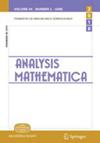一类特殊的绝对单调函数及其与分支过程的关系
IF 0.6
3区 数学
Q3 MATHEMATICS
引用次数: 0
摘要
显示地图z↦ log(1−c−1 log(1–z))在[0,1)上是绝对单调的当且仅当c≥1。该证明基于相关泰勒系数的积分表示和两个伽玛函数商的Gautschi二重不等式之一。该结果用于验证,对于每个c≥1和α∈(0,1],映射z↦ 1−exp(c−c(1−c−1 log(1−z))α)在[0,1)上是绝对单调的。本文章由计算机程序翻译,如有差异,请以英文原文为准。
A particular family of absolutely monotone functions and relations to branching processes
It is shown that the map z ↦ log(1 − c−1 log(1 − z)) is absolutely monotone on [0, 1) if and only if c ≥ 1. The proof is based on an integral representation for the associated Taylor coefficients and on one of Gautschi’s double inequalities for the quotient of two gamma functions. The result is used to verify that, for every c ≥ 1 and α ∈ (0, 1], the map z ↦ 1 − exp(c − c(1 − c−1 log(1 − z))α) is absolutely monotone on [0, 1). The proof exploits a continuous-time discrete state space branching process.
求助全文
通过发布文献求助,成功后即可免费获取论文全文。
去求助
来源期刊

Analysis Mathematica
MATHEMATICS-
CiteScore
1.00
自引率
14.30%
发文量
54
审稿时长
>12 weeks
期刊介绍:
Traditionally the emphasis of Analysis Mathematica is classical analysis, including real functions (MSC 2010: 26xx), measure and integration (28xx), functions of a complex variable (30xx), special functions (33xx), sequences, series, summability (40xx), approximations and expansions (41xx).
The scope also includes potential theory (31xx), several complex variables and analytic spaces (32xx), harmonic analysis on Euclidean spaces (42xx), abstract harmonic analysis (43xx).
The journal willingly considers papers in difference and functional equations (39xx), functional analysis (46xx), operator theory (47xx), analysis on topological groups and metric spaces, matrix analysis, discrete versions of topics in analysis, convex and geometric analysis and the interplay between geometry and analysis.
 求助内容:
求助内容: 应助结果提醒方式:
应助结果提醒方式:


